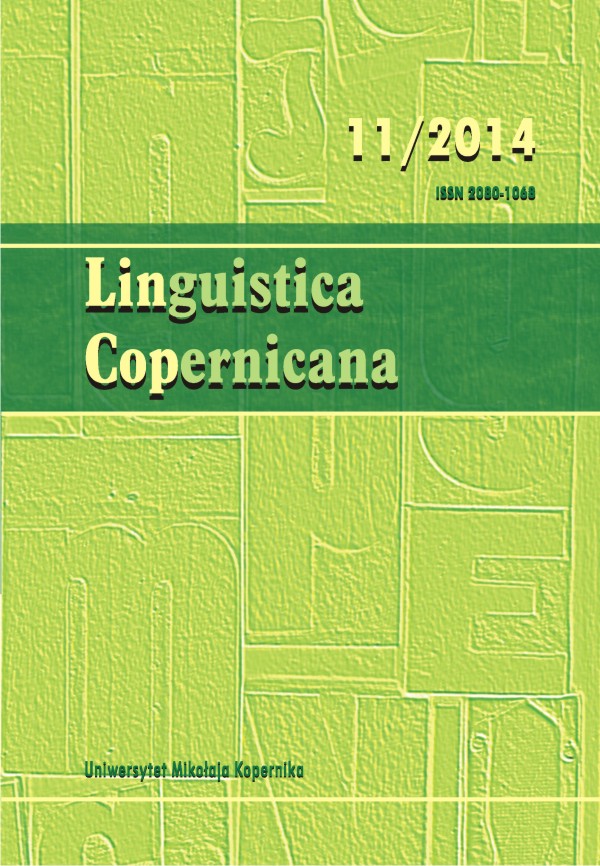Duftende Texte. Über die Spuren des Olfaktorischen in literarischen Texten
DOI:
https://doi.org/10.12775/LinCop.2014.048Słowa kluczowe
olfaktorische Wahrnehmung, Textlinguistik, literarischer TextAbstrakt
Das Parfum von Patrick Süskind gilt als ein literarischer Text, dessen lexikalische Ebene einen großen Reichtum an sprachlich-stilistischen Mitteln aufweist, die gebraucht werden, um das zu wiederspiegeln, was der im Roman kreierten Textwelt zugrunde liegt, und zwar den Duft. Olfaktorische Eindrücke mit Hilfe von Worten zu beschreiben, scheint besonders kompliziert zu sein, weil diese Eindrücke höchstindividuell sind und durch persönliche Erlebnisse jedes einzelnen Rezipienten beeinflusst sind, weil sie aus seinem Vorwissen ihre Kraft schöpfen. Die Sprache, die der Autor des Romans Das Parfum gebraucht, beeindruckt durch den Reichtum von Vergleichen und Metaphern, die dazu beitragen, dass der Umgang mit diesem literarischen Text zum Erlebnis wird. Der Beitrag setzt sich zum Ziel, Das Parfum zum Objekt einer linguistischen Analyse zu machen, in deren Zentrum sich der literarische Titel und seine Realisierung im Ko-Text befinden. Die Antwort auf die Frage danach, wie die einzelnen Düfte und Gerüche kreiert werden, ist dank der Beschreibung von sprachlichen Strukturen und stilistischen Mitteln möglich, die dem kohärenten und konsequent gemalten Bild von olfaktorischen Eindrücken zugrunde liegen.Bibliografia
BILUT-HOMPLEWICZ Z., 1998, Zur Dialogtypologie in der Erzählung aus textlinguistischer Sicht, Rzeszów: Wydawnictwo Wyższej Szkoły Pedagogicznej.
BUDER G., 1982, Titel und Text. Information und Wirkung des italienischen Novellen-titels (G. Verga, L. Pirandello, A. Moravia) vor und während der Textlektüre, Rheinfelden: Verlag Schäuble.
CHRISTMANN U., SCHREIER, M., 2003, Kognitionspsychologie der Textverarbeitung und Konsequenzen für die Bedeutungskonstitution literarischer Texte, In: F. Janni-dis, G. Lauer, M. Martiney, S. Winko (Hrsg.): Regeln der Bedeutung. Zur Theorie der Bedeutung literarischer Texte, Berlin, New York: Walter de Gruyter, S. 247–285.
DUDEN, Deutsches Universalwörterbuch, 2003, Mannheim: Dudenverlag.
ECO U., 1984, Nachschrift zum ‘Namen der Rose’, Aus dem Italienischen von Burkhart Kroeber, München, Wien: Deutscher Taschenbuch Verlag.
EHLICH K., 2010, Text und sprachliches Handeln. Die Entstehung von Texten aus dem Bedürfnis der Überlieferung, In: K. Ehlich, Sprache und sprachliches Handeln. Band 3: Diskurs – Narration – Text – Schrift, Berlin, New York: Walter de Gruyter, S. 483–508.
HANUS A., 2001, Zur Besonderheit der literarischen Kommunikation am Beispiel eines Dramentextes, Lingua ac Communitas 11, S. 39–57.
HAUSENDORF H., 2008, Zwischen Linguistik und Literaturwissenschaft: Textualität revisited. Mit Illustrationen aus der Welt der Urlaubsansichtskarte, Zeitschrift für germanistische Linguistik, H. 36.3, S. 319–342.
JÄGER L., 2002, Transkriptivität. Zur medialen Logik der kulturellen Semantik, In: L. Jäger, G. Stanitzek (Hrsg.), Transkribieren. Medien/Lektüre, München: Fink, S. 19–41.
KRUTSCHE D., 2003, Wie kommt der Leser in den Text? Sprachliche Pragmatik und literarische Fiktion, In: A. Redder (Hrsg.), Diskurse und Texte. Festschrift für Konrad Ehlich zum 65. Geburtstag, Tübingen: Stauffenberg Verlag, S. 137–149.
MAKOWSKA M., 2010, Titel bahnt den Weg. Über semantische Beziehungen zwischen Titel und Text, Acta Philologica 38, S. 95–102.
NIKULA H., 2003, Gibt es den literarischen Text?, In: E. Forgács (Hrsg.), Germanistik – Traditionspflege und neue Herausforderungen: Festschrift zum 110. Jahrestag der Gründung des Lehrstuhls für deutsche Sprache und Literatur an der Hochschulfakultät „Gyula Juhász” der Universität Szeged, Szeged: Grimm Kiadó, S. 47–54
NIKULA H., 2004, Der literarische Text als Objekt der Linguistik, In: A. Jäntti, J. Nurminen (Hrsg.), Thema mit Variationen. Dokumentation des VI. Nordischen Germanistentreffen in Jyväskylä vom 4.–9.6.2002. (= Finnische Beiträge zur Ger-manistik; 12), S. 265–272.
NIKULA H., 2008, Der „Stil” des literarischen Textes – gibt es ihn überhaupt?, In: T. A. Fritz, G. Koch, I. Trost (Hrsg.), Literaturstil. Festschrift für Hans-Werner Eroms zum 70, Geburtstag, Heidelberg: Universitätsverlag Winter, S. 1–17.
PILZ A., 1992, Der literarische Titel. Ein textlinguistisches Phänomen, Texlinguistik 17, S. 52–62.
PILZ A., 1993, Semantische Beziehungen zwischen Titel und Text. Zur Rolle des Titels im Textverstehen, In: G. Bartels, I. Pohl (Hrsg.), Wortschatz-Satz-Text: Beiträge der Konferenzen in Greifswald und Neubrandenburg, Frankfurt/M: Peter Lang Verlag, S.
–434.
PILZ A., 1995, Linguistische Untersuchungen zur rezeptionssteuernden Funktion von Titel literarischer Texte, Marburg: Tectum-Verlag.
SCHNOTZ W., 2006, Was geschieht im Kopf des Lesers? Mentale Konstruktionsproze-sse beim Textverstehen aus der Sicht der Psychologie und der kognitiven Lingui-stik, In: H. Blühdorn, E. Breindl, U. H. Wassner, Text-verstehen: Grammatik und darüber hinaus, Institut für Deutsche Sprache, Berlin, New York: Walter de Gruy-ter, S. 222–238.
WEIMAR K., 2003, Literarische Bedeutung? In: F. Jannidis, G. Lauer, M. Martiney, S. Winko (Hrsg.), Regeln der Bedeutung. Zur Theorie der Bedeutung literarischer Texte, Berlin, New York: Walter de Gruyter, S. 228–245.
WEINRICH H., 2006, Titel für Texte, In: H. Weinrich, Sprache, das heißt Sprachen, Tübingen: Gunter Narr Verlag, S. 101–115.
Pobrania
Opublikowane
Jak cytować
Numer
Dział
Statystyki
Liczba wyświetleń i pobrań: 847
Liczba cytowań: 0



